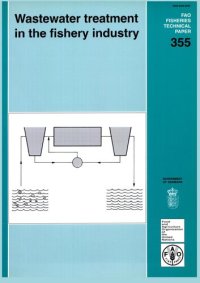
Ebook: Wastewater treatment in the Fishery Industy
Author: J.F. González
- Series: FAO Fisheries Technical Paper 355
- Year: 1995
- Publisher: FAO
- City: Rome
- Edition: 1
- Language: English
- pdf
This document provides an introduction and orientation to fish processors on the concepts of fisheries wastewater characterization and to the various types of treatment that can be applied. Similar to most processing industries, fish processing operations produce wastewater, which contains active organic contaminating organisms in soluble, colloidal and particulate form. Depending on the particular operation, the degree of contamination may be small (e.g., washing operations), mild (e.g., fish filleting), or heavy (e.g., bloodwater drained from fish storage tanks). The magnitude of the problem created by these wastewater streams cannot be generalized, and is strictly related to the individual case, since the impact depends, inter alia on the strength of the effluent, the rate of discharge, and the assimilatory capacity of the receiving waterbody. Section 2 (Characterization) explains the main pollution parameters that may have to be taken into account when characterizing a wastewater and also when evaluating the quality or efficiency of a wastewater treatment system. Section 3 (Primary treatment) deals first with the most simple operations that can be performed on an effluent in order to reduce its contaminant load, such as screening and settling. The separation of oil and grease is explained, followed by a description of flotation. Section 4 is devoted to the biological treatments. The concepts of aerobic and anaerobic processes are explained, followed by description of the most common operations of biological treatment. The aeration systems are explained in detail, since they are a key factor for the success of aerobic treatments. Section 5 explains the most common operations of physicochemical treatment: first the coagulation and flocculation used essentially to remove colloidal matter present in wastewaters; and then the disinfection processes such as chlorination and ozonation. Section 6 deals with the most simple treatment processes for sludges generated during the primary biological and physicochemical. treatment. Section 7 discusses economic issues related to wastewater treatment processes.
Download the book Wastewater treatment in the Fishery Industy for free or read online
Continue reading on any device:

Last viewed books
Related books
{related-news}
Comments (0)